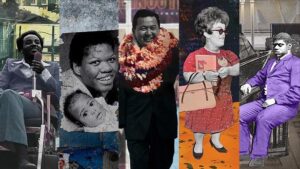Discover the story of a street musician, born with a condition that left her limbs unusable. In 1975, Tate Harrington won a custody battle against the Philadelphia Department of Child Welfare, which sought to take away her infant daughter, claiming that she could not provide adequate care. See how Tate Harrington’s fight to be a mother and earn an independent living was a revolutionary act.
Educational Resources: Celestine Tate Harrington: Building a Legacy PBS LearningMedia Video, Discussion Questions and Teaching Tips (Grades 9-12)
Watch Full Episode
Watch Full Episode(Open Captioning + ASL)
Watch Full Episode(Extended Audio Description + Open Captioning)
Learn More About Celestine Tate Harrington
Learn More about American Masters Renegades
More About Celestine Tate Harrington:
n 1975, Tate Harrington had her first daughter, Nia. When the Philadelphia Department of Public Welfare attempted to take away her infant daughter, claiming that Harrington was physically incapable of caring for a child, she successfully defended her right to parent. In the courtroom, Tate Harrington demonstrated her skills – dressing and undressing her daughter, and changing her diaper, using only her lips, teeth, and tongue – and retained custody. She went on to share her story on radio and television shows like Howard Stern, Sally Jesse Raphael, and Donahue. Tate Harrington even self-published a book which she wrote with her tongue on a typewriter titled Some Crawl and Never Walk (1995). Renegades: Celestine Tate Harrington demonstrates how Tate Harrington created a legacy by working every angle given to her and using the limited preconceived notions of others to change the narrative of who she was, and prove that she was capable of raising and providing for a family and breaking the cycle of poverty for generations to come.
The fundamental right to parent without interference has been argued in courts and is protected by the U.S. Constitution. But a recent study found that nearly 20% of children in the U.S. foster care system have a parent with a disability. Almost fifty years since Tate Harrington’s custody battle, 42 States and the District of Columbia have laws in place that cite parental disability as grounds for termination of parental rights. For Tate Harrington, fighting to be a mother and earn an independent living was a revolutionary act, and her struggles mirror those of the broader disability community today.
The episode features interviews with: Nia Tate-Ball and Coronda Tate, Celestine Tate Harrington’s daughters; Jannie Watson, Nia Tate-Balls’s godmother; Tamogene Tate-Ebataleye, Harrington’s sister; Alberto Esquenaz, M.D., Chief Medical Officer, and Nathaniel Mayer, M.D., Physical Medicine and Rehab Specialist at Jefferson Moss Magee Rehab; and Robyn M. Powell, Ph.D., J.D., Family Law & Disability Rights Attorney.



